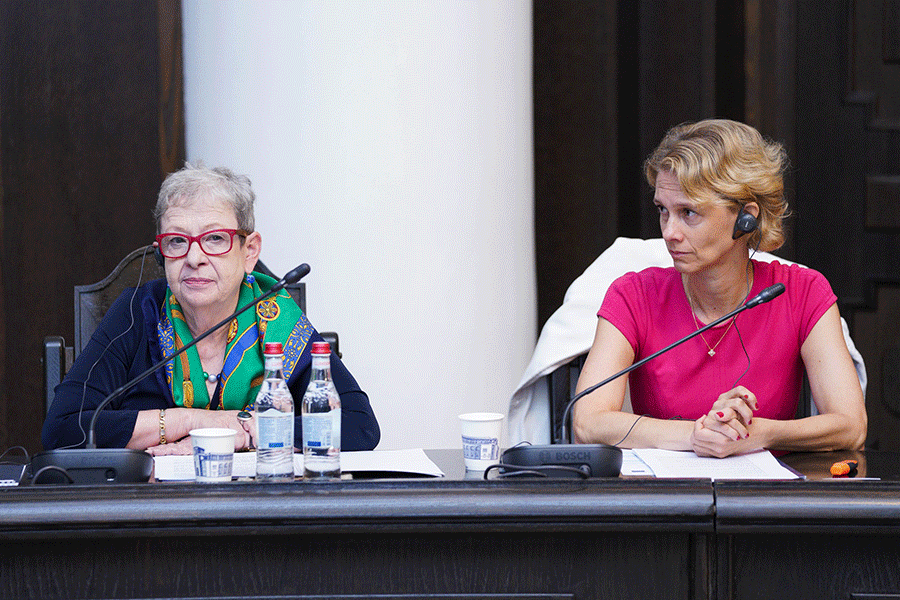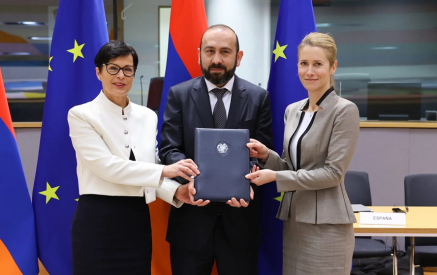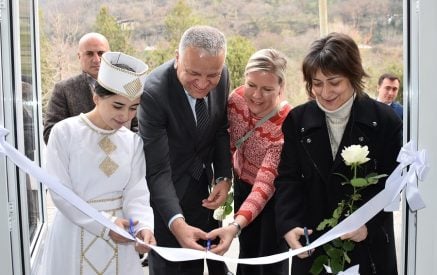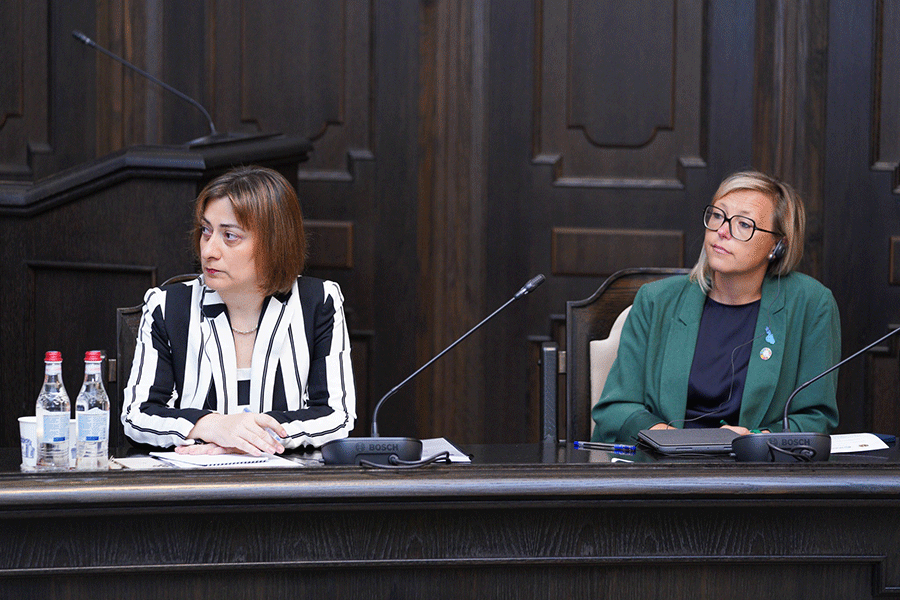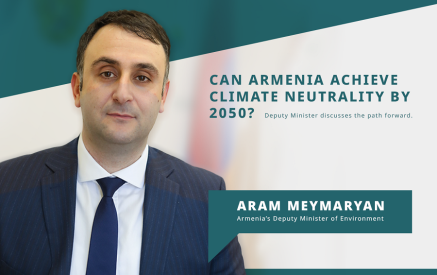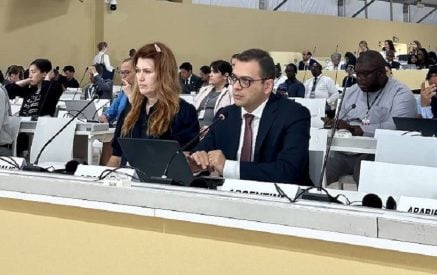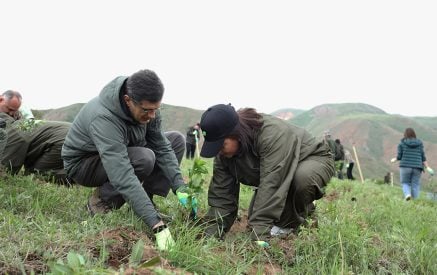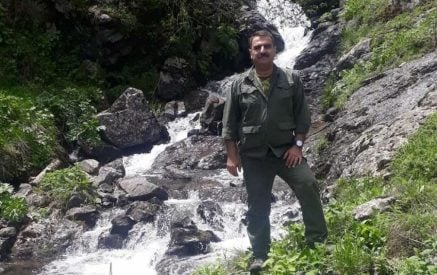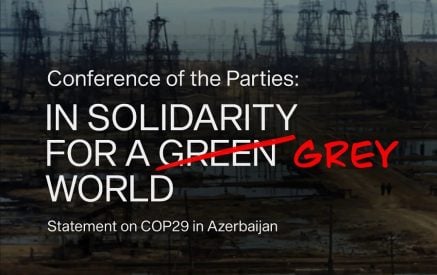The Third Policy Dialogue of the Joint GREEN Armenia Platform
YEREVAN, [12/07/2023] – The Government of Armenia and international partners continue their high-level policy dialogue aimed at supporting Armenia’s sustainable green recovery and growth that can deliver jobs, tackle poverty and inequalities, protect nature and build the resilience of the country.
The third in the series of policy dialogues of the GREEN Armenia (Growth and Recovery to Empower, Equip and Nurture Armenia) platform, chaired by Deputy Prime Minister of Armenia Tigran Khachatryan, took place today, 12 of July. The meeting was attended by Ambassador Andrea Wiktorin, Head of the European Union (EU) Delegation to Armenia, Natia Natsvlishvili, Resident Representative of the United Nations Development Programme (UNDP) in Armenia, and Carolin Geginat, Country Manager of the World Bank (WB) for Armenia. Representatives of the line ministries, private sector, academia, civil society, and other development organisations were also present.
The main objective of the event was to discuss the improvement of air quality in Armenia, including the development of air quality strategies and modern monitoring systems as well as legislative alignment with CEPA to ensure proper implementation and enforcement of concrete actions for the positive impact on the ground and cleaner air but as well brainstorm how to reduce air pollution for the overall well-being of Armenian citizens.
Read also
The Government of Armenia has undertaken efforts on improvement of air quality policy and monitoring, but there is a need for further investments.
The third dialogue allowed the Government’s representatives to share knowledge on examples of air pollution reduction and mitigation in line with the recent roadmap for the upgrade of the Air Quality Monitoring system in Armenia.
“In our daily life we encounter with large amounts of data, the collection and processing of which could be utilized in the decision making process. From this perspective, the establishment of a complex air monitoring system is an essential prerequisite. By providing access to reliable data, the air quality monitoring system will enable us to better understand and identify the sources of air pollution, as well as their nature and impact, which will lay strong foundations for evidence-based policymaking and targeted interventions” noted Deputy Prime Minister Tigran Khachatryan.
The Air Quality Monitoring concept developed under the EU4Climate project and the steps required for its implementation were presented. Armenian legislation harmonisation towards the European Air Quality Directives was part of the discussion as well as planned awareness-raising action together with potential procurement of automated air quality monitoring stations to provide relevant data flow as a basis for information to the public.
“Making the air in our cities cleaner and safer requires joint ownership and the engagement of all parts of society. We have seen some progress, but it is not sufficient and we cannot be complacent as there are many challenges in front of us. Donors, including the EU and the Government of Armenia, need to take action against climate change for the benefit of citizens” said Ambassador Andrea Wiktorin, Head of the EU Delegation to Armenia.
“The policies on climate change, air quality protection and industrial emissions control are closely interlinked with public health and human rights for clean air and access to information on the state of environment. Many of the sources of air pollutants and greenhouse gases are the same. Therefore, a combined strategic planning that meets the challenges of both climate change and air pollution has obvious ground for well-informed political decision-making. There is also increasing evidence that abatement costs can be reduced significantly, if climate change and air pollution control strategies are developed jointly,” said Natia Natsvlishvili, UNDP Resident Representative in Armenia.
Specific thematic discussions also took place on major ongoing initiatives in Armenia aimed at facilitating the country’s transition to a green economy and a more sustainable development path.
“The World Bank works towards the creation of shared prosperity, which also includes ensuring that the health of citizens is protected. Armenia is the 22nd most polluted country in the world and this comes at a cost. A recent World Bank study shows that the welfare costs associated with air pollution by fine particles (PM2.5) in Armenia represent about 10.6 % of GDP, compared to 3.8% on average in the EU. Recognizing the urgency of the agenda, the Government of Armenia has recently adopted the updated Law on Atmospheric Air Protection. We urge Government to press ahead quickly with the implementation of the law to improve the lives and health of all Armenians, “ said Carolin Geginat, World Bank Country Manager for Armenia.
Representatives of the Government of Armenia, development community, the private sector, academia, and civil society organisations highlighted the necessity of creating an enabling environment for improving air quality monitoring.
Delegation of the European Union to Armenia


















































